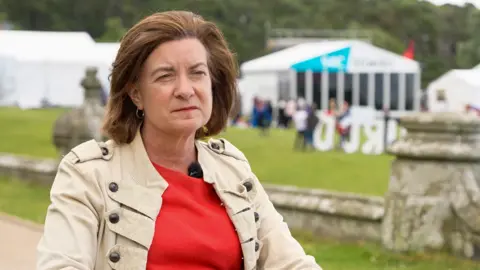### First Minister Calls for End to the Two-Child Benefit Cap
Wales’ First Minister, Eluned Morgan, has requested the Labour Party leader, Sir Keir Starmer, to eliminate the controversial two-child benefit cap that was established by the Conservative UK government in 2017. Morgan’s concerns center around the detrimental impact this policy has had on child poverty levels across Wales. As she articulates, the present governmental guidelines restrict most families from accessing means-tested benefits when they have additional children born after April 2017, creating a financial burden that has left many struggling.
Speaking at the Urdd Eisteddfod, an annual Welsh cultural festival, Morgan expressed her governmental commitment to addressing child poverty in Wales. She believes that the continuation of the two-child cap exacerbates the plight of vulnerable families. Her statements have echoed a broader concern about the overlooked welfare of children, particularly in economically challenged segments of society.
### Call to Action from UK Government
The conversation around the two-child benefit cap has gained traction following recent commentary from Bridget Phillipson, the UK government’s Education Secretary for England. Phillipson acknowledged that the cap has significantly contributed to pushing families into poverty and indicated that discussions are underway regarding its potential removal. This aligns with Morgan’s urgent plea for action, emphasizing that the two-child limit is not just a policy issue but one that tangibly affects children’s lives across Wales.
In a political response, approval has also been expressed by members of Plaid Cymru, the national party of Wales, although they have levied accusations of hypocrisy against the Labour Party. Morgan’s prior criticisms of calls to repeal the cap have come back to haunt her, as Plaid Cymru’s representatives cite a lack of consistency in Labour’s policies and commitments concerning welfare support.
### Welsh Government’s Stance on Poverty
Eluned Morgan has not shied away from discussing the stark realities faced by families living in poverty within her region. During her dialogues with Prime Minister Rishi Sunak, she stressed that the welfare policies affecting Welsh citizens need urgent attention and reform. Morgan is acutely aware that the forthcoming child poverty strategy slated for release in the autumn holds critical implications for her government’s welfare agenda.
The First Minister underscored the damaging effects of the cap, stating, “We think it is damaging for lots of families in Wales.” This declaration highlights her government’s proactive stance towards safeguarding the well-being of children in Wales, and she is keen on elevating this pressing issue within broader discussions about fiscal policy and welfare.
### Navigating Competing Interests in Government
In her advocacy, Morgan emphasized that the plea to scrap the two-child benefit cap is more than a political maneuver; it is a beacon of hope for families seeking additional support. The Chancellor of the Exchequer, Rachel Reeves, is set to conclude her spending review soon, which will lay the groundwork for the government’s fiscal priorities heading into the next general election. Morgan branded the moment as a critical opportunity for highlighting the urgent need to address child poverty.
Conversations are ongoing between Morgan and Starmer, with both leaders aiming to manage the responsibilities of governance in their respective regions. Morgan recognized that while she has formed a good rapport with Starmer, their priorities may differ due to the complexities of leading separate governments. This differentiation underscores the need for collaboration on issues impacting constituents directly.
### Plaid Cymru’s Response
The response from Plaid Cymru has been critical, characterizing Morgan’s shift in stance as “staggering hypocrisy.” Their spokesperson, Sioned Williams, highlighted past actions by Labour, where party members rejected calls to abolish the cap in the Welsh parliament. The intensity of Plaid Cymru’s criticism is compounded by the narrative that Labour is reacting based on polling metrics rather than a principled commitment to battle child poverty.
This confrontation indicates a fraught political landscape where the issue of welfare policies, particularly those affecting children, remains central to public discourse. With the ongoing debates and differing perspectives, the fate of the two-child benefit cap hangs in the balance, paving the way for significant implications for families across Wales. The culmination of these discussions is slated for autumn when the broader strategy on child poverty will be delineated by the UK government.



